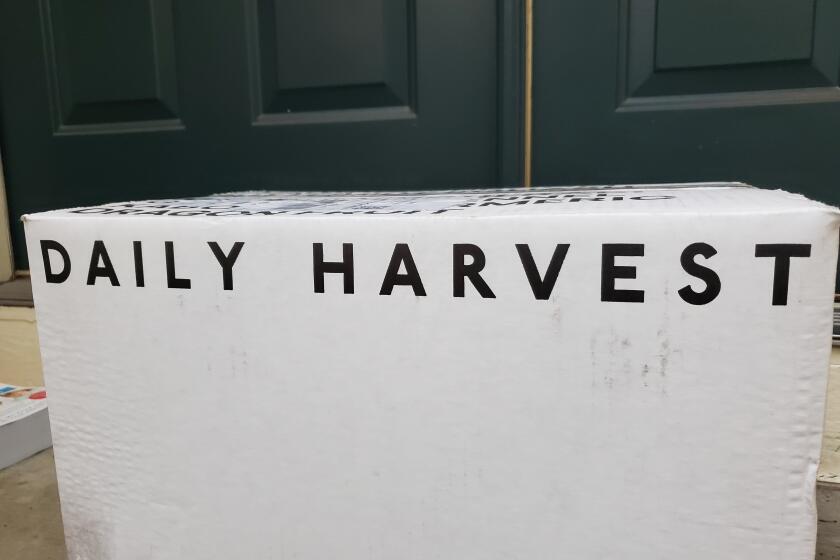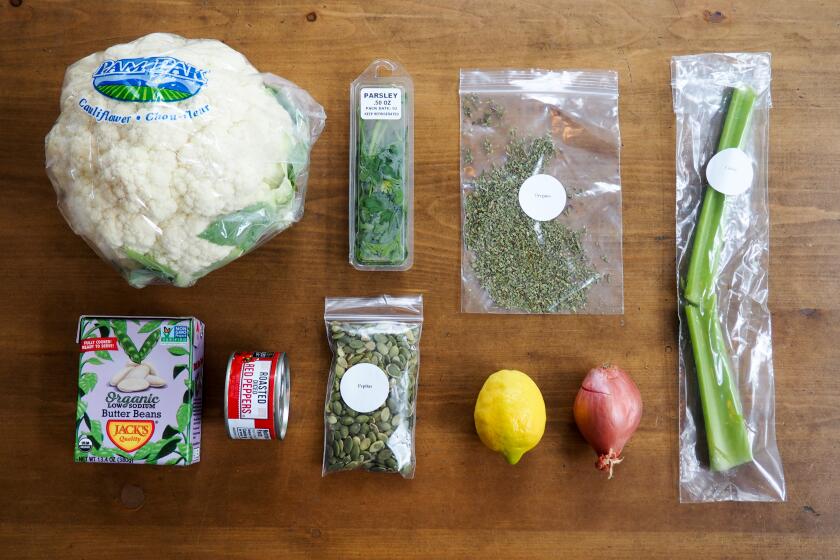Food poisoning and unsafe temperatures: Many meal kit companies aren’t FDA regulated

Days after trying a new lentil product from the meal subscription company Daily Harvest, Los Angeles resident Jackie Sloboda was debilitated by full-body itching, stabbing abdominal pains and jaundice that turned her skin and eyes yellow.
On her third day in a West L.A. hospital, as she worried that she was dying of liver failure, Sloboda, 36, learned that the product she had eaten twice had just been recalled. Soon, hundreds of people in 36 states would report gastrointestinal pain and abnormal liver function, and 113 would be hospitalized, the highest number of any known U.S. foodborne illness outbreak this year, according to federal data.
“I’ve been run over by a car before, and this was more painful,” said Sloboda, who is still suffering from fatigue two months later. “Awful doesn’t even begin to describe it. I’m upset, I’m angry, and I’m anxious for the future of my health.”
The Daily Harvest case is the first widespread instance of foodborne illness reported in the $15-billion meal kit industry, which surged in popularity during the COVID-19 pandemic. The outbreak has shone a light on something that few consumers know: Most meal delivery companies are not regulated by the Food and Drug Administration.
Of the hundreds of companies that ship ready-to-heat meals or recipe kits to U.S. consumers, very few are required to register with the FDA. The firms are also not required to follow a slew of FDA safety requirements that aim to limit the spread of foodborne illness, ensure sanitary conditions during shipping and improve supply-chain transparency.
There is little consistency in how the firms are inspected and regulated at the state and local level, experts say. They warn that rapid changes in the meal delivery industry, combined with the slow pace of federal regulation and the inherent uncertainty of mailing perishable food, have in effect made it impossible for U.S. health officials to understand the scope of foodborne illnesses among meal delivery customers.
Daily Harvest said Thursday that it is conducting a ‘root cause investigation’ in conjunction with the FDA. But some customers feel left in the dark.
“It is pretty much the Wild West,” said Bill Hallman, a Rutgers University professor who has studied foods shipped by mail.
Daily Harvest, which is popular with health-conscious Californians and counts Gwyneth Paltrow among its investors, had distributed 28,000 bags of the French Lentil + Leek Crumbles to customers and Instagram influencers through the mail and at a pop-up vegan deli in Venice Beach.
Many customers drawn by Daily Harvest’s promise of quick, nutritious frozen foods said the severity of their illnesses, and the lack of information about what caused their symptoms, has left them feeling betrayed.
“They were organic, vegan, sustainably packaged, all these supposedly great things, so I just trusted that it was healthy,” said Alyssa Mera, 29, a commercial real estate agent in San Diego County who was hospitalized with excruciating abdominal pain after eating the lentil crumbles twice.
Daily Harvest did not respond to questions about where its foods are manufactured or how the firm is regulated. In an email, a representative said the company’s recall had been a success, as “no one has reported to Daily Harvest that they unknowingly ate the product after June 17, the date the recall was announced.” The latest reported onset of symptoms was July 16, the FDA said.
Made of legumes, mushrooms and butternut squash, the French Lentil + Leek Crumbles were designed to be sautéed and used as a substitute for ground meat in dishes such as pastas, salads and tacos.
Less than a month after the product launched, customers began to complain of jaundice, full-body itching, severe abdominal pain and gastrointestinal problems. Stories about mystery symptoms snowballed on Reddit and Instagram.
More than 470 people have now reported symptoms. Bill Marler, a Seattle attorney who specializes in foodborne illness, is representing 356 people, including 34 Californians. He said 26 people have had their gallbladders removed and eight had liver biopsies.
After 470 people reported cases of illness related to a Daily Harvest menu item, the company’s CEO says, ‘I recognize this is so frustrating.’
Marler is also representing a mother who was hospitalized for a week with severe abdominal pain, as well as her 4-month-old daughter, who suffered from diarrhea, vomiting and elevated levels of liver enzymes after being breastfed.
“This obviously is a severe case,” Marler said. “Not knowing what it is that’s making people sick is creating a lot of anxiety.”
Five weeks after the recall, Daily Harvest told customers that they had been sickened by an ingredient called tara flour, made from the seed of a tree native to Peru. The FDA has not confirmed that finding, and Daily Harvest did not respond to questions about how the company isolated tara as the tainted ingredient.
In a July 19 email, Chief Executive Rachel Drori told customers that Daily Harvest used tara for the “first and only time” in the lentil crumbles. Why the flour would have sickened people is still unclear; she said testing revealed that the ingredient was not contaminated with poisonous molds, pesticides, heavy metals, or foodborne pathogens such as E. coli or salmonella.
Marler is also representing 29 people who reported similar symptoms after drinking a pineapple-mango smoothie sold by one of Daily Harvest’s competitors, Revive Superfoods. Revive, which did not respond to requests for comment, has not recalled the smoothie but is no longer selling it online, Marler said.
Under U.S. law, most companies that make a majority of their income by selling directly to consumers are regulated by state and local governments, rather than by the FDA. That exemption, originally designed to apply to grocery stores and restaurants, now applies to many new meal delivery companies that sell directly to consumers from websites and do not stock their products in grocery stores.
“This is something that has grown very quickly, and the federal regulatory agencies have not been able to keep pace,” said Mitzi Baum, the chief executive of the nonprofit Stop Foodborne Illness. “There is no consistency.”
The FDA declined to make officials available for an interview. But in public documents, the agency has said that changes to regulations for the e-commerce industry — which includes meal delivery, meal kit companies and third-party apps such as UberEats and DoorDash — could “significantly” reduce foodborne illness.
Daily Harvest, a direct-to-consumer meal kit company, said Tuesday it had identified the ingredient that has sickened hundreds of customers.
That business model, the FDA said, “may not be currently covered” by the Food Safety Modernization Act, the first major reform since the 1930s of the country’s fragmented food safety system. The 2010 law aims to prevent foodborne illness by reducing the spread of harmful pathogens in food processing facilities, rather than investigating symptoms after outbreaks occur.
The FDA held a conference on the topic last fall and is “considering what we have learned in shaping a path forward regarding how best to ensure the safety of these foods,” spokeswoman Janell Goodwin said in an email.
Firms that qualify for a retail exemption are not required to register with the FDA but can still be inspected by the agency, Goodwin said. In general, she said, the companies are “primarily” regulated by state, local, tribal and territorial health officials.
That’s not always popular with the health departments tasked with inspecting and licensing meal kit and meal delivery companies, said Steven Mandernach, executive director of the Assn. of Food and Drug Officials.
In some cases, Mandernach said, inspectors who are more familiar with gas station convenience stores and restaurant kitchens are examining warehouse-like facilities where dozens of different foods are simultaneously processed and shipped.
“I’ve talked to the biggest of the country’s health departments, and they’ve expressed the same concerns,” Mandernach said. “They don’t want to send their inspectors in there.”
The handful of meal delivery firms that are registered with the FDA have reported multiple recalls in the last few years.
When salmonella bacteria were found in onions across the U.S., Hello Fresh and Blue Apron both recalled tens of thousands of meal kits. And Thistle, a San Francisco company that sells ready-to-eat meals and drinks, recalled two flavors of juice in May because strawberries used in the beverages may have been contaminated with hepatitis A.
Here are a few strategies that experts and food safety officials recommend to ensure that meal-kit supplies and ready-to-heat meals are safe to eat.
If a company makes mistakes in handling raw ingredients, killing pathogens or vetting the quality of products from suppliers, and “you don’t have federal regulators coming in and telling you that your program is designed incorrectly, then you’ve got a problem,” said Cori Muse, a food safety regulatory consultant who has worked with meal kit companies.
Once a meal delivery box leaves a processing facility, the rules get fuzzier.
Federal regulators have no say over whether raw meal kit ingredients are shipped in refrigerated trucks or whether they reach customers at a safe temperature, experts say. The government also has not stipulated how foods should be packed or cooled to avoid cross contamination or spoilage.
Meal deliveries, often shipped through third-party carriers such as FedEx and UPS, can be held up on unrefrigerated trucks for an extra day, or can sit on doorsteps in triple-digit heat for hours.
“It is difficult for consumers to know if the food that’s sitting in their fridge is safe,” said Megan Fisch, a food safety auditor and consultant.
Many meal kits contain dairy, meat and raw vegetables that should be kept at different temperatures. If products aren’t packed and cooled properly, things can go wrong, such as raw chicken leaking onto a vegetable that is meant to be served raw, experts say.
In a study that is still in peer review, researchers at North Carolina State University found that more than 75% of boxes ordered from a dozen major meal delivery companies arrived with at least one food item in the temperature “danger zone” of 40 to 140 degrees. Bacteria grow fastest in that range, doubling in number in as little as 20 minutes.
Half the companies sent boxes that contained meat or poultry in the temperature “danger zone,” researchers found. And nearly all of the boxes packed with cooling gel packs had at least one food item that was too warm.

Subscribers get exclusive access to this story
We’re offering L.A. Times subscribers special access to our best journalism. Thank you for your support.
Explore more Subscriber Exclusive content.
When customers get sick from a meal delivery company, chances are slim that health inspectors will learn about it, in part because of how the U.S.’ foodborne illness response system is designed, experts say.
Health departments typically wait to investigate foodborne illness until they have received reports of multiple people in the same area with a confirmed illness caused by the same pathogen, said Darin Detwiler, a professor of food policy at Northeastern University.
If 16 people get sick from eating the same meal kit dinner, but the customers are spread across 12 states, there may not be enough people in one region to trigger an investigation, even if every sick person confirmed the cause of their illness with a doctor, Detwiler said.
“Unless it makes a national newspaper, unless it gets so big that it becomes a huge multistate thing, it’s almost as if you’ll never know,” he said.
The Times interviewed five people who lived in Los Angeles County who were sickened by the Daily Harvest crumbles. A spokesperson for the L.A. County Department of Public Health said officials had received one complaint of illness and are not investigating because “the recalling firm is an online retail operation which ships the product directly to the consumer.”
Jennifer Coward, 54, of Rolling Hills Estates had been a loyal Daily Harvest customer for years. She bought both flavors of the crumble product — walnut and thyme, and French lentil and leek — when they launched. At the end of May, she sautéed a small portion of each to try them.
Within a few days, the real estate agent was confined to bed with nausea, crushing fatigue, dizziness and full-body itching. Doctors thought her symptoms were a sign of autoimmune hepatitis.
Were it not for the news about Daily Harvest spreading online, Coward said, she would have had a liver biopsy, a painful procedure that can require removing nearly an inch of organ tissue.
The FDA appears to acknowledge an outbreak linked to Daily Harvest’s lentil crumbles, and L.A. County public health confirms a case was reported locally.
Daily Harvest’s first emails to customers about the outbreak, sent in mid-June, were not handled well, Coward said. The company said the product should be thrown away because a “small number” of people reported “gastrointestinal discomfort.” But Daily Harvest did not mention liver problems and did not include contact information for the FDA.
“Discomfort is not what I experienced,” Coward said. “I was seriously sick.”
Two months passed before Coward’s liver enzymes returned to normal levels. The experience left her shaken and grateful she hadn’t eaten a full serving.
“It’s scary to think that I am doing the best I can to eat healthy and make the right decisions on how to eat,” Coward said. “And still, at any point in time, you could be poisoned.”
Finding basic information about many meal delivery companies, including where their ready-to-heat and pre-measured ingredients are processed, is a challenge, said Ben Chapman, a professor and food safety specialist at North Carolina State University. Most of those companies are not required to provide information to consumers about where or how their food is processed and produced.
Some companies process their own ingredients and pack their own boxes. Others hire third-party manufacturers, an arrangement called “co-packing.” A few operate under fictitious business names, making them more difficult to trace.
“It’s like a puzzle where there are a lot of pieces missing,” Chapman said. Even experts, he said, struggle to untangle the web of manufacturers, distributors and retailers.
Marler has alleged in court documents that a Minnesota frozen foods company manufactured the crumbles product for Daily Harvest. Daily Harvest did not respond to questions about which firm produced the lentil product, or whether any of its 140 other products are made in-house or by third-party manufacturers.
Daily Harvest has not disclosed its tara flour supplier, but Marler said he plans to “ultimately force that disclosure” in court.
Such transparency problems could be partially fixed by requiring companies that sell meal kits directly to consumers to register with federal officials and provide basic information on their operations and safety plans inside their production facilities, said Hallman, the Rutgers University professor.
Because most meal delivery companies repackage produce and other ingredients into plain bags or branded packaging, customers can’t refer to a serial number or a stamp to know whether they’re eating tainted products. Instead, they rely on the company to tell them when a raw ingredient may not be safe to eat.
Under the current system, companies that aren’t registered with the FDA may not always notify consumers about those safety issues, said Muse, the food safety consultant.
“It’s essentially the honor system,” Muse said. “The companies will say, ‘What’s the chance that they could link it to us?’”
More to Read
Sign up for Essential California
The most important California stories and recommendations in your inbox every morning.
You may occasionally receive promotional content from the Los Angeles Times.















